高一英语外研版必修一Module 2 My New Teachers Speaking&Everyday English课件(共53张PPT)
文档属性
| 名称 | 高一英语外研版必修一Module 2 My New Teachers Speaking&Everyday English课件(共53张PPT) |  | |
| 格式 | zip | ||
| 文件大小 | 681.0KB | ||
| 资源类型 | 教案 | ||
| 版本资源 | 外研版 | ||
| 科目 | 英语 | ||
| 更新时间 | 2019-01-21 20:07:19 | ||
图片预览

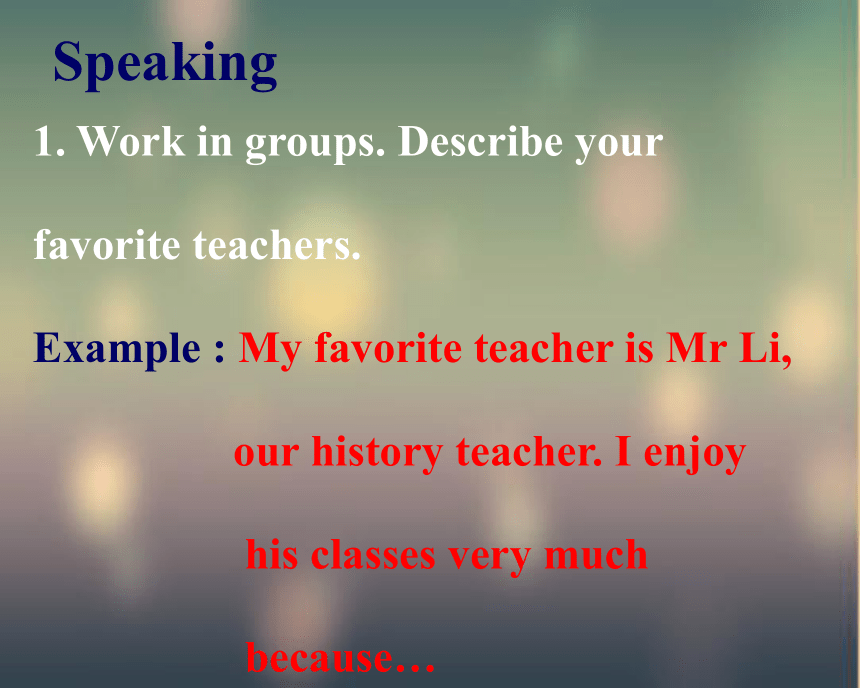

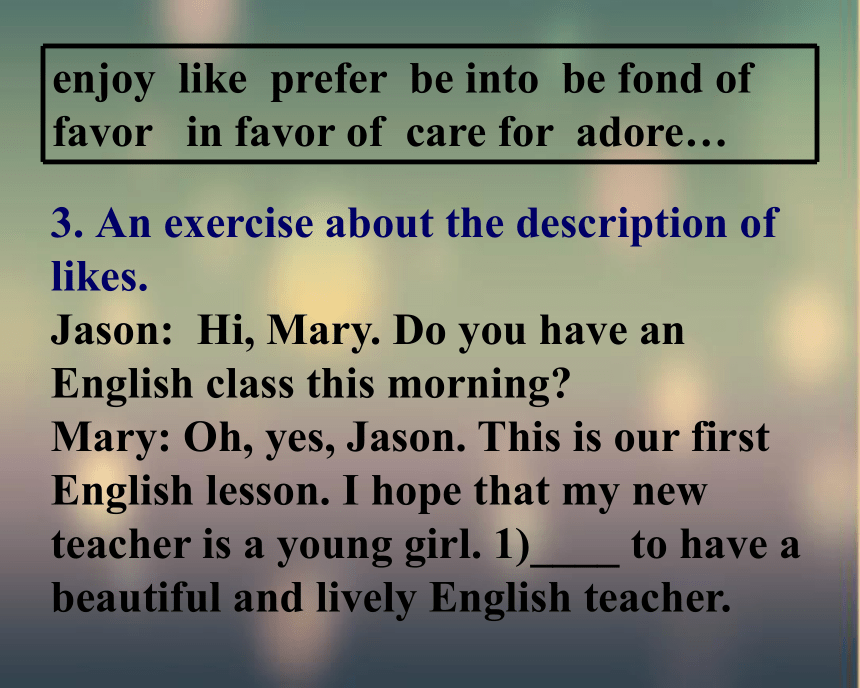
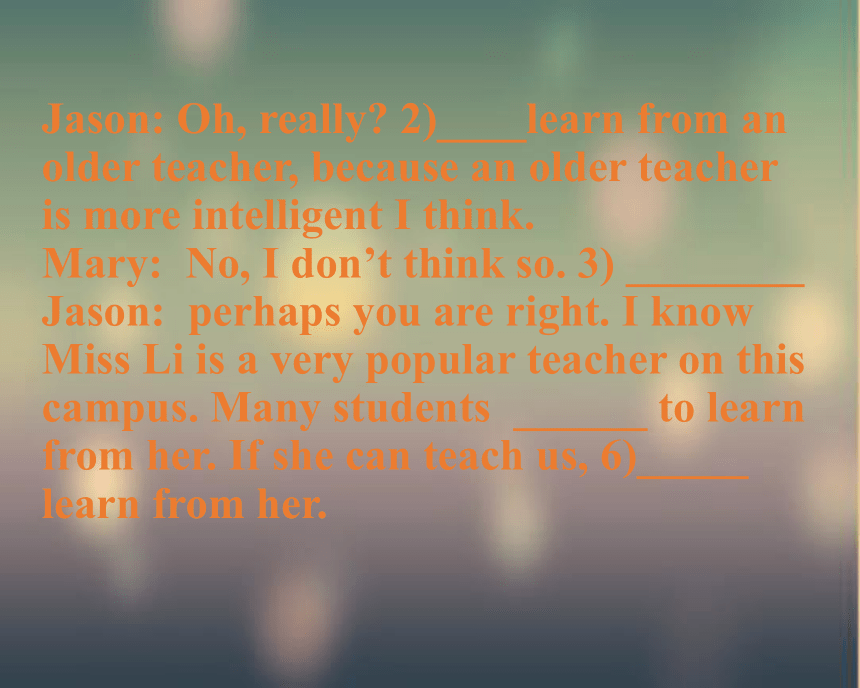
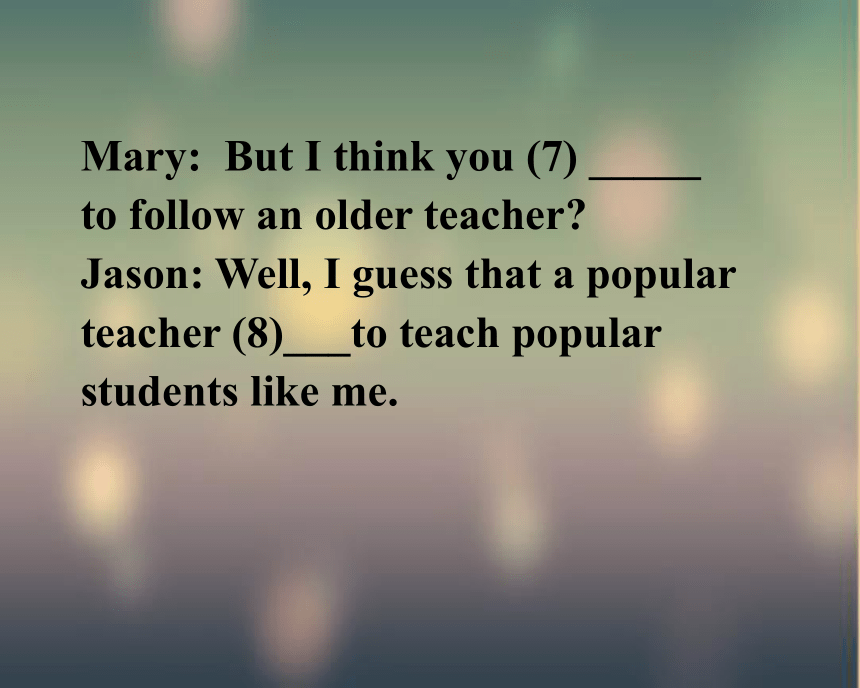

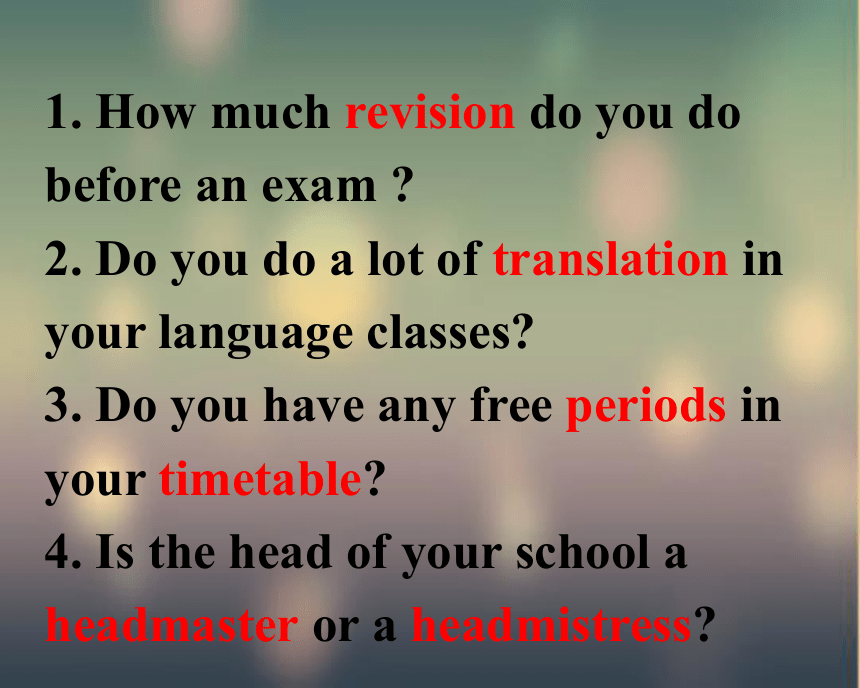
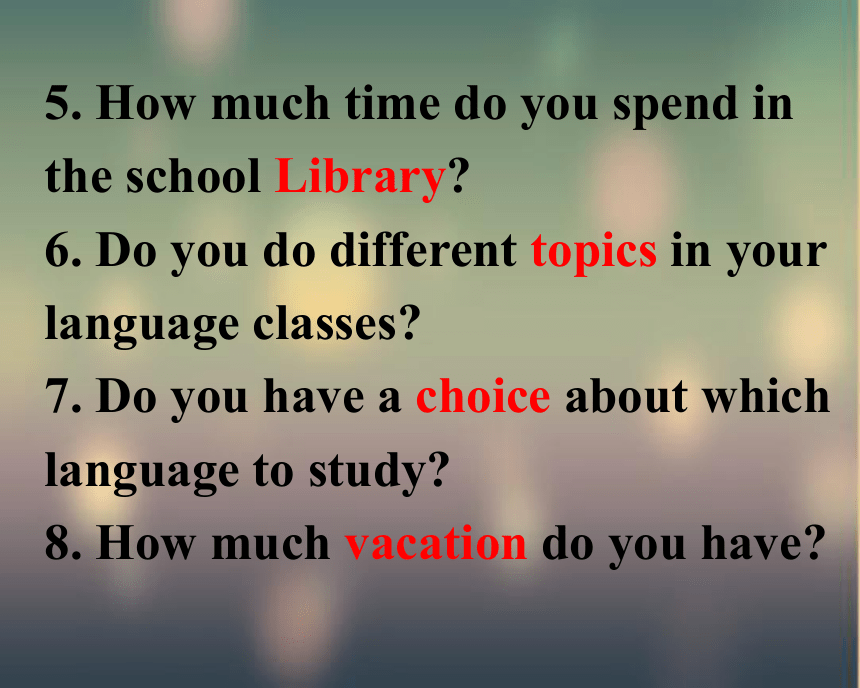

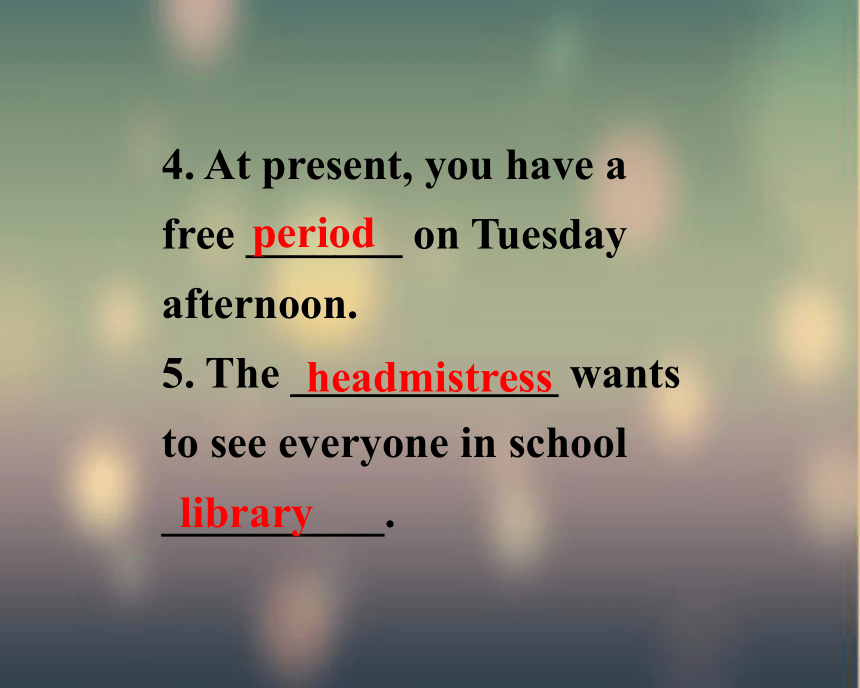

文档简介
课件53张PPT。高一外研版必修一 Module 2
My New Teachers
Speaking
Listening and Vocabulary
Pronunciation Function
Everyday English Writing Speaking 1. Work in groups. Describe your
favorite teachers.
Example : My favorite teacher is Mr Li,
our history teacher. I enjoy
his classes very much
because…
2. Work in pairs. Talk about the parts
of school life you enjoy most and why. An exercise about the description of
likes.
Jason: Hi, Mary. Do you have an
English class this morning?
Mary: Oh, yes, Jason. This is our first
English lesson. I hope that my new
teacher is a young girl. 1)____ to have a
beautiful and lively English teacher.Jason: Oh, really? 2)____learn from an
older teacher, because an older teacher
is more intelligent I think.
Mary: No, I don’t think so. 3) ________
Jason: perhaps you are right. I know
Miss Li is a very popular teacher on this
campus. Many students ______ to learn
from her. If she can teach us, 6)_____
learn from her.Mary: But I think you (7) _____
to follow an older teacher?
Jason: Well, I guess that a popular
teacher (8)___to teach popular
students like me.Pre-listening – 1. Vocabulary Answer the questions about the words in the box1. How much revision do you do
before an exam ?
2. Do you do a lot of translation in
your language classes?
3. Do you have any free periods in
your timetable?
4. Is the head of your school a
headmaster or a headmistress?5. How much time do you spend in the school Library?
6. Do you do different topics in your
language classes?
7. Do you have a choice about which language to study?
8. How much vacation do you have?
1. This afternoon I’m going to give you a______ .
2. We can either do some_______ or we can do some _________.
3. Firstly, have you all got your new__________ .Listening – 1 Comlplete the sentences
with the words in red in activity 1choicerevisiontranslationtimetables4. At present, you have a free _______ on Tuesday afternoon.
5. The ____________ wants to see everyone in school __________.periodheadmistresslibraryStudents will have _____ soon.
(a) a vacation (b) exams (c) a test
2. Most of the class want to do ____.
a revision (b) translation
(c) comprehension
3. The topic that most students want to
study is____.
Life in the future (b) Travel
(c) Life in the pastbaalistening – 2. Listen to the conversation and choose the right answers4. Students are going to do____ on Tuesday afternoon.
(a) geography (b) history (c) French 5. The headmaster want to see the students at_____ o’clock. (a) three (b) two (c) one caThink about which of these English
language areas is the most difficult for
you and which is the easiest. Write down
the reasons whygrammarvocabularyreadingtranslationconservationlisteningwritingExplain the connection between these words and phrases. Example:
If you do well in an exam you will pass; if you do badly you will fail.
1. pass/fail exam
2. senior school junior school
3. teacher subject4. playground students
5. excellent good
6. test revision
7. result exam
8. textbook schoolbag
Possible answers:2. senior school junior schoolSenior school is where you go after junior
school; it is for older students.
3. teacher subjectAt senior school you usually have a different teacher for each subject4. playground studentsThe students go into the playground at
break and lunch time; it is where they
can play games, talk and walk.
5. excellent good
If you are very good at a subject, your
teacher will say you are an excellent student.
6. test revision
When you have a teat, you need to do some revision to check whether you know
everything.
7. result exam
When the teacher has marked your exam
you will get the results—for example 75
out of 100. 8. textbook schoolbag
When you take your textbooks home to do your homework, you put them into your schoolbag.Tape script
(St=Student Mr S=Mr Stanton )Mr. S: Okay, kids, as you know, the exams are coming up soon, so we need to start work on revision. This afternoon I’m going to give you a choice. We can either do some revision or we can do some translation. It’s up to you.
St: I’d rather do translation than revision,
Mr. Stanton.
Mr. S: How many people would like to do
translation?Chorus of voices: I would/Me/I’d like to do translation.
Mr. S: That’s eight of you. So the rest of you would prefer to do revision, is that right?
Chorus of voices: Yes.
Mr. S: That’s sixteen of you. So that’s settled. We’ll do revision. I’m going to give you a choice of topic, too. Do you want to revise Life in the future.
St: I’d prefer to do Travel
Mr. S: Hands up for Life in the future. (Students raise their hands)Eighteen of you. The choice is made. But
before we start, there are a couple of things I need to say to you. Firstly, have you all got your new timetables?
Chorus of voices: Yes
Mr. S: Good. Can you take a look at them?
OK, Now, at present you have a free period on Tuesday afternoons. Well, that’s been changed and you’ve got French instead. Have you got that?
Chorus of voices: Yes.
Mr. S: Excellent. And there’s one other thing. The headmaster wants to see everyone in the library at three this afternoon. OK?
Chorus of voices: Yes.
Mr. S: Right. Let’s begin our revision of Life in the future.1. We can either do some revision or we can do some translation.
either …or…表示在两种可能性中任选一个,意为“或者……或者……”; “要么……要么……”用来连接并列的句子成分。
(1) 不是你错就是他错了。(并列主语)
Either you or he is wrong.Language Points(2) 你既可以写信也可以打电话索取一本.(并列谓语)
You can either write or phone to ask for a copy.
(3) 我不是把它放在桌子上就是把它放在抽屉里了。(并列状语)
I left it either on the table or in the drawer.(4) 你在会上可以说英语也可以说法语。
(并列宾语)
You can either speak English or French.
(5) 你不去晚会就呆在家里看孩子。
(并列句子)
Either you go to the party, or you stay at home looking after the baby.注意:
either…or…连接主语时,谓语动词使用近主语原则。
不是你就是我去参见会议。
Either you or I am going to attend the meeting.
不是我就是你去参加会议。
Either I or you are going to attend the meeting.
____ you go out, or I’ll call the police.
A. Either B. Neither C. Unless D. If A2 I’d prefer to do Travle.
would prefer to do sth= would like to do sth
更愿意做某事
我想早点做这件事。
I’d prefer to do it earlier.
我想步行去那儿,因为有这么多车。
I’d prefer to go there on foot, for there’s so much traffic.拓展:
prefer sth to sth
宁愿要……而不要……
prefer doing to doing
宁愿做……而不做……
prefer to do rather than do
宁愿做……而不做……
prefer sb to do sth
宁愿某人做……
巩固练习
1. 我宁愿独处也不愿意和他们在一起。
I prefer to be alone rather than stay with them.
2. 我愿意步行而不愿意骑自行车。
I prefer walking to cycling.
3. 他喜欢茶不喜欢咖啡。
She prefers tea to coffee.
4. 我爸希望我早点回家。
My father prefers me to go home early.5. Rather than ____ on a crowded bus, he always prefers ____ a bicycle.
A ride, ride B riding, ride
C ride, to ride D to ride, riding
6. I prefer studying English at home ____ the match.
A to watching B to watch
C rather than watch D rather than watchingCA3 I’d rather do Life in the Future.
would rather do 宁愿做……
would rather do than do 宁愿做……而不做……
would do rather than do 宁愿做……而不做……
我宁愿呆在家里也不愿意去看电影。
I would rather stay at home than go to the theater.choice test fail
student junior playground
exam revision vacationPronunciation-1 Listen and repeat
these words. Notice the stressed
sound.pass result senior school
subject topic translationPronunciation-2 underline the
stressed sound in these wordsLook at these statements from
the listening passage and choose
the correct answers.
1. I’d prefer to do “Travel”.
2. I’d rather do “ Life in the Future
3. I’d rather do translation than
revision.
Function and SpeakingA. I’d means___.
(a) I would (b) I had
B. I’d prefer is followed by___.
(a) the verb with to (b) the verb
without to
C. I’d rather can be followed by ____.
(a) then (b) than
aab1. Would you like to go to the school play tonight.
I /rather /stay/ home/ revise ________________________________
2. Shall we do some work on vocabulary?
I / prefer /do / work /grammar ________________________________ 3.Why don’t we study in the library?
I / prefer/ study / home I’d rather stay at home and revise.I’d prefer to do work on grammar.2. Write the answers to the following
questions. Use the words provided and add
other words where necessary._____________________________
4.Which do would you rather play, tennis or badminton? I /rather /play tennis/ badminton ______________________________
5.Who would you prefer to work with, Li Kang or Zhou Kai? I / prefer/ work / Zhou Kai ________________________________ 6.Which would you rather discuss next week, 19th century literature or 20th century literature? I /rather/dicuss 20th century literature/19th century literature _____________________________________I’d prefer to study at home.I’d rather play tennis than badminton.I’d prefer to work with Zhou Kai.I’d rather discuss 20th century literature.Example:
Student A: what about history and geography?
Student B: I’d rather study history than geography because I can learn a lot from many historical figures.3. Work in pairs. Which subject/ course
would you prefer to have? Explain why. 1. English /Russian
2. Physics / chemistry
3. IT / biology
4. Japanese /PE
5. Maths / Chinesehave you got that
take a look
kids
That’s settled
a couple of things
It’s up to you . have a look
Children
Do you understand
D. several things
E. It’s now decided.
F. You decide.Everyday English—1 matchingHave you got that Take a look kids that’s settled a couple of things it’s up to youEveryday English—1 Filling the blanks A: Shall I go to the meeting?
B: You decide — ____________.2. A: __________ at this picture. Isn’t it
beautiful?
B: Yes, it’s lovely.
3. A: There are ________________ I need
to do.
B: Do you need help with them?
4. A: Your history classes are now on
Monday at eleven, Tuesday at three
and Friday at 9:30. ______________ ?It’s up to youTake a looka couple of thingsHave you got thatB: No. Could you repeat it please?
5. A: So ___________, we’ll start at
nine tomorrow.
B: Fine, nine tomorrow.
6. A: Come on ____, let’s go.
B: Wait for me!that’s settledkids1. It’s up to you 由你来决定。 be up to (1) 计谋什么(坏事) I see what you are up to. 我知道你在动什么歪脑筋。 (2) 胜任(通常用于疑问或否定句中) She’s not up to the job. 她不胜任那个工作。 Language Points(3) 由某人来决定
那件事由他来决定。
It’s up to him to decide it.
2. There are a couple of things I need to do.
a couple of (1) 两个的,一对的
他们养了两条狗。
They keep a couple of dogs.
(2) 两三个的,几个的
几封信
a couple of letters
3. Have you got that?
你记下来了吗?
你明白了吗?4. That’s settled.
就这样确定了。
5. Come on kids, let’s go!
kids 小孩子;年轻人 Surprisingly, all the students got
good marks.
2. I’m doing maths, chemistry, physics,
and biology.
3. It’s sometimes difficult for me to
understand him, but I do my best.
4. They’re intelligent, hard-working and
lively students.
5. It was a difficult problem, I disagree.Pre-writing--look at the position of commas in these sentences. Writing
Now punctuate this paragraph. Use full stops, capital letters, question marks
and commas where necessary.
What is a good teacher I don’t think there is one answer only to this important question because good teachers can be strict kind lively quiet amusing or serious however there are some things that a good teacher must do for example he or she must plan his or her lessons carefully ?,,,,,H.F,,and must explain things clearly if not students will have problems also it’s very important for teachers to have discipline in the class don’t you think so finally a good teacher needs to like his students and enjoy teaching I believe that’s very important.I,.A,?F..Homework
Write a description of your new English teacher, talking about the good qualities that the teacher have and the good qualities that you wish your teacher to have.THANK YOU
My New Teachers
Speaking
Listening and Vocabulary
Pronunciation Function
Everyday English Writing Speaking 1. Work in groups. Describe your
favorite teachers.
Example : My favorite teacher is Mr Li,
our history teacher. I enjoy
his classes very much
because…
2. Work in pairs. Talk about the parts
of school life you enjoy most and why. An exercise about the description of
likes.
Jason: Hi, Mary. Do you have an
English class this morning?
Mary: Oh, yes, Jason. This is our first
English lesson. I hope that my new
teacher is a young girl. 1)____ to have a
beautiful and lively English teacher.Jason: Oh, really? 2)____learn from an
older teacher, because an older teacher
is more intelligent I think.
Mary: No, I don’t think so. 3) ________
Jason: perhaps you are right. I know
Miss Li is a very popular teacher on this
campus. Many students ______ to learn
from her. If she can teach us, 6)_____
learn from her.Mary: But I think you (7) _____
to follow an older teacher?
Jason: Well, I guess that a popular
teacher (8)___to teach popular
students like me.Pre-listening – 1. Vocabulary Answer the questions about the words in the box1. How much revision do you do
before an exam ?
2. Do you do a lot of translation in
your language classes?
3. Do you have any free periods in
your timetable?
4. Is the head of your school a
headmaster or a headmistress?5. How much time do you spend in the school Library?
6. Do you do different topics in your
language classes?
7. Do you have a choice about which language to study?
8. How much vacation do you have?
1. This afternoon I’m going to give you a______ .
2. We can either do some_______ or we can do some _________.
3. Firstly, have you all got your new__________ .Listening – 1 Comlplete the sentences
with the words in red in activity 1choicerevisiontranslationtimetables4. At present, you have a free _______ on Tuesday afternoon.
5. The ____________ wants to see everyone in school __________.periodheadmistresslibraryStudents will have _____ soon.
(a) a vacation (b) exams (c) a test
2. Most of the class want to do ____.
a revision (b) translation
(c) comprehension
3. The topic that most students want to
study is____.
Life in the future (b) Travel
(c) Life in the pastbaalistening – 2. Listen to the conversation and choose the right answers4. Students are going to do____ on Tuesday afternoon.
(a) geography (b) history (c) French 5. The headmaster want to see the students at_____ o’clock. (a) three (b) two (c) one caThink about which of these English
language areas is the most difficult for
you and which is the easiest. Write down
the reasons whygrammarvocabularyreadingtranslationconservationlisteningwritingExplain the connection between these words and phrases. Example:
If you do well in an exam you will pass; if you do badly you will fail.
1. pass/fail exam
2. senior school junior school
3. teacher subject4. playground students
5. excellent good
6. test revision
7. result exam
8. textbook schoolbag
Possible answers:2. senior school junior schoolSenior school is where you go after junior
school; it is for older students.
3. teacher subjectAt senior school you usually have a different teacher for each subject4. playground studentsThe students go into the playground at
break and lunch time; it is where they
can play games, talk and walk.
5. excellent good
If you are very good at a subject, your
teacher will say you are an excellent student.
6. test revision
When you have a teat, you need to do some revision to check whether you know
everything.
7. result exam
When the teacher has marked your exam
you will get the results—for example 75
out of 100. 8. textbook schoolbag
When you take your textbooks home to do your homework, you put them into your schoolbag.Tape script
(St=Student Mr S=Mr Stanton )Mr. S: Okay, kids, as you know, the exams are coming up soon, so we need to start work on revision. This afternoon I’m going to give you a choice. We can either do some revision or we can do some translation. It’s up to you.
St: I’d rather do translation than revision,
Mr. Stanton.
Mr. S: How many people would like to do
translation?Chorus of voices: I would/Me/I’d like to do translation.
Mr. S: That’s eight of you. So the rest of you would prefer to do revision, is that right?
Chorus of voices: Yes.
Mr. S: That’s sixteen of you. So that’s settled. We’ll do revision. I’m going to give you a choice of topic, too. Do you want to revise Life in the future.
St: I’d prefer to do Travel
Mr. S: Hands up for Life in the future. (Students raise their hands)Eighteen of you. The choice is made. But
before we start, there are a couple of things I need to say to you. Firstly, have you all got your new timetables?
Chorus of voices: Yes
Mr. S: Good. Can you take a look at them?
OK, Now, at present you have a free period on Tuesday afternoons. Well, that’s been changed and you’ve got French instead. Have you got that?
Chorus of voices: Yes.
Mr. S: Excellent. And there’s one other thing. The headmaster wants to see everyone in the library at three this afternoon. OK?
Chorus of voices: Yes.
Mr. S: Right. Let’s begin our revision of Life in the future.1. We can either do some revision or we can do some translation.
either …or…表示在两种可能性中任选一个,意为“或者……或者……”; “要么……要么……”用来连接并列的句子成分。
(1) 不是你错就是他错了。(并列主语)
Either you or he is wrong.Language Points(2) 你既可以写信也可以打电话索取一本.(并列谓语)
You can either write or phone to ask for a copy.
(3) 我不是把它放在桌子上就是把它放在抽屉里了。(并列状语)
I left it either on the table or in the drawer.(4) 你在会上可以说英语也可以说法语。
(并列宾语)
You can either speak English or French.
(5) 你不去晚会就呆在家里看孩子。
(并列句子)
Either you go to the party, or you stay at home looking after the baby.注意:
either…or…连接主语时,谓语动词使用近主语原则。
不是你就是我去参见会议。
Either you or I am going to attend the meeting.
不是我就是你去参加会议。
Either I or you are going to attend the meeting.
____ you go out, or I’ll call the police.
A. Either B. Neither C. Unless D. If A2 I’d prefer to do Travle.
would prefer to do sth= would like to do sth
更愿意做某事
我想早点做这件事。
I’d prefer to do it earlier.
我想步行去那儿,因为有这么多车。
I’d prefer to go there on foot, for there’s so much traffic.拓展:
prefer sth to sth
宁愿要……而不要……
prefer doing to doing
宁愿做……而不做……
prefer to do rather than do
宁愿做……而不做……
prefer sb to do sth
宁愿某人做……
巩固练习
1. 我宁愿独处也不愿意和他们在一起。
I prefer to be alone rather than stay with them.
2. 我愿意步行而不愿意骑自行车。
I prefer walking to cycling.
3. 他喜欢茶不喜欢咖啡。
She prefers tea to coffee.
4. 我爸希望我早点回家。
My father prefers me to go home early.5. Rather than ____ on a crowded bus, he always prefers ____ a bicycle.
A ride, ride B riding, ride
C ride, to ride D to ride, riding
6. I prefer studying English at home ____ the match.
A to watching B to watch
C rather than watch D rather than watchingCA3 I’d rather do Life in the Future.
would rather do 宁愿做……
would rather do than do 宁愿做……而不做……
would do rather than do 宁愿做……而不做……
我宁愿呆在家里也不愿意去看电影。
I would rather stay at home than go to the theater.choice test fail
student junior playground
exam revision vacationPronunciation-1 Listen and repeat
these words. Notice the stressed
sound.pass result senior school
subject topic translationPronunciation-2 underline the
stressed sound in these wordsLook at these statements from
the listening passage and choose
the correct answers.
1. I’d prefer to do “Travel”.
2. I’d rather do “ Life in the Future
3. I’d rather do translation than
revision.
Function and SpeakingA. I’d means___.
(a) I would (b) I had
B. I’d prefer is followed by___.
(a) the verb with to (b) the verb
without to
C. I’d rather can be followed by ____.
(a) then (b) than
aab1. Would you like to go to the school play tonight.
I /rather /stay/ home/ revise ________________________________
2. Shall we do some work on vocabulary?
I / prefer /do / work /grammar ________________________________ 3.Why don’t we study in the library?
I / prefer/ study / home I’d rather stay at home and revise.I’d prefer to do work on grammar.2. Write the answers to the following
questions. Use the words provided and add
other words where necessary._____________________________
4.Which do would you rather play, tennis or badminton? I /rather /play tennis/ badminton ______________________________
5.Who would you prefer to work with, Li Kang or Zhou Kai? I / prefer/ work / Zhou Kai ________________________________ 6.Which would you rather discuss next week, 19th century literature or 20th century literature? I /rather/dicuss 20th century literature/19th century literature _____________________________________I’d prefer to study at home.I’d rather play tennis than badminton.I’d prefer to work with Zhou Kai.I’d rather discuss 20th century literature.Example:
Student A: what about history and geography?
Student B: I’d rather study history than geography because I can learn a lot from many historical figures.3. Work in pairs. Which subject/ course
would you prefer to have? Explain why. 1. English /Russian
2. Physics / chemistry
3. IT / biology
4. Japanese /PE
5. Maths / Chinesehave you got that
take a look
kids
That’s settled
a couple of things
It’s up to you . have a look
Children
Do you understand
D. several things
E. It’s now decided.
F. You decide.Everyday English—1 matchingHave you got that Take a look kids that’s settled a couple of things it’s up to youEveryday English—1 Filling the blanks A: Shall I go to the meeting?
B: You decide — ____________.2. A: __________ at this picture. Isn’t it
beautiful?
B: Yes, it’s lovely.
3. A: There are ________________ I need
to do.
B: Do you need help with them?
4. A: Your history classes are now on
Monday at eleven, Tuesday at three
and Friday at 9:30. ______________ ?It’s up to youTake a looka couple of thingsHave you got thatB: No. Could you repeat it please?
5. A: So ___________, we’ll start at
nine tomorrow.
B: Fine, nine tomorrow.
6. A: Come on ____, let’s go.
B: Wait for me!that’s settledkids1. It’s up to you 由你来决定。 be up to (1) 计谋什么(坏事) I see what you are up to. 我知道你在动什么歪脑筋。 (2) 胜任(通常用于疑问或否定句中) She’s not up to the job. 她不胜任那个工作。 Language Points(3) 由某人来决定
那件事由他来决定。
It’s up to him to decide it.
2. There are a couple of things I need to do.
a couple of (1) 两个的,一对的
他们养了两条狗。
They keep a couple of dogs.
(2) 两三个的,几个的
几封信
a couple of letters
3. Have you got that?
你记下来了吗?
你明白了吗?4. That’s settled.
就这样确定了。
5. Come on kids, let’s go!
kids 小孩子;年轻人 Surprisingly, all the students got
good marks.
2. I’m doing maths, chemistry, physics,
and biology.
3. It’s sometimes difficult for me to
understand him, but I do my best.
4. They’re intelligent, hard-working and
lively students.
5. It was a difficult problem, I disagree.Pre-writing--look at the position of commas in these sentences. Writing
Now punctuate this paragraph. Use full stops, capital letters, question marks
and commas where necessary.
What is a good teacher I don’t think there is one answer only to this important question because good teachers can be strict kind lively quiet amusing or serious however there are some things that a good teacher must do for example he or she must plan his or her lessons carefully ?,,,,,H.F,,and must explain things clearly if not students will have problems also it’s very important for teachers to have discipline in the class don’t you think so finally a good teacher needs to like his students and enjoy teaching I believe that’s very important.I,.A,?F..Homework
Write a description of your new English teacher, talking about the good qualities that the teacher have and the good qualities that you wish your teacher to have.THANK YOU
